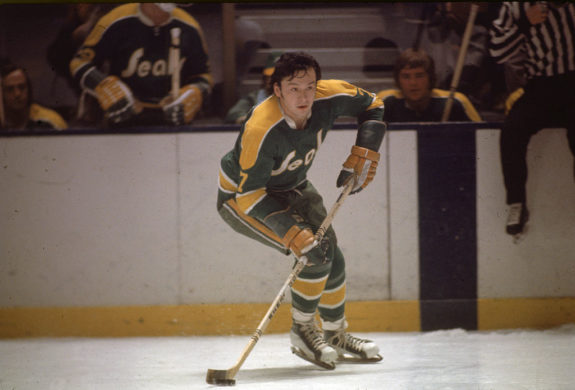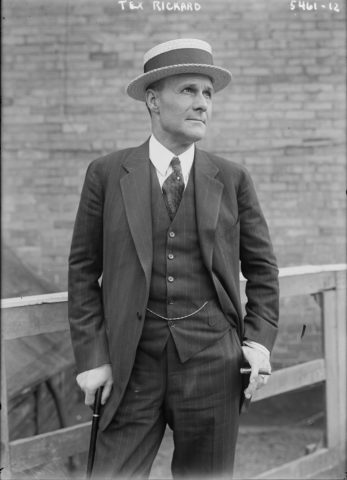The NHL lied.
There weren’t six original teams when the league began operations for the 1917-18 season. There were technically only four. And, of those, only one—the Montreal Canadiens—has essentially survived up to the present day.
The “Original Six” as fans know it, only came to be a few decades later, with the relatively late-joining Detroit Red Wings even having undergone several drastic name changes by then (Detroit Cougars and Falcons).
Neither will make the below list of the top six teams some of you will swear never existed (in honor, why not, of the aforementioned Original Six), with each entry corresponding to a gone, but, hopefully now, slightly less forgotten one-time NHL franchise.
RELATED: Who Were The Original 6?
6. California Golden Seals
Initially joining the NHL for the 1967-68 season as the California Seals, this franchise eventually died as the Cleveland Barons in 1978. They’re probably best known for trading away the chance to draft Guy Lafleur to the Montreal Canadiens back in 1970, meaning Habs fans at least remember the franchise very well, hence the No. 6 spot on this list.

Could Lafleur have saved the franchise? Hmmph. Can Seals swim?
*Pauses*
Uh… yes, maybe? I’m not a marine biologist. But golden seals certainly can’t float at least, with the team eventually being forced to merge with the Minnesota North Stars in 1978.
5. Ottawa Senators
The first Ottawa Senators were one of the original NHL teams and actually enjoyed a great deal of success, winning four championships (in the NHL) before moving to St. Louis and becoming the Eagles in 1934-35.
The franchise unfortunately ended much like the expansion 1992-93 Senators began, placing last in their last few seasons in Ottawa and then last again their one year in St. Louis.
Hopes for a return to Canada (for this specific franchise) never materialized and the team ceased operations. St. Louis obviously ended up getting another team before Ottawa, with the Stanley Cup drought for each city continuing to this day.
4. Montreal Wanderers
Another “Original Four” team, the Montreal Wanderers were, almost fittingly, left without a home several games into the inaugural season when the Montreal Arena burned down. The Habs, who shared the arena at the time, returned to Jubilee Arena, where they had played before.
RELATED: NHL Oddities We’ll Never See Again
Meanwhile, the Wanderers withdrew from the league/were stripped of their membership (one of those depending-on-who-you-ask things). It was in part due to earlier demands that the league’s other three teams provide them with players in order to stay competitive after losing brothers Sprague and Odie Cleghorn to injury and military duties respectively.
Even after the fire, no help was forthcoming, and the Wanderers willingly walked away from the league with a record of 1-5 (the NHL entry draft clearly not existing at the time).
3. New York Americans
The New York Americans, who actually predate the New York Rangers, in a way live on through the American Hockey League’s Rochester team of the same name. In a more, actual, less-sentimental way, they, uh, died following the 1941-42 season after 17 seasons in the NHL.

They became the Brooklyn Americans for that final season, nevertheless still playing their games at Madison Square Garden and thankfully minimizing the parallels between them and today’s (still) New York Islanders.
2. Quebec Athletics
Before the Quebec Nordiques (before the Colorado Avalanche), there were the Quebec Athletics. Technically, before the Americans there were the Athletics as well.
Originally known as the Bulldogs, the Quebec Athletic Club was a founding member of the NHL, but only managed to play in the new league starting in the 1919-20 season, due to financial troubles.
Despite Quebec’s Joe Malone leading the league in scoring, they put together a last-place 4-20 record and were eventually sold, becoming the Hamilton Tigers the following season.
After their fifth year in Hamilton, operations were suspended due to Tigers players demanding more money for extra games added to the schedule. The expansion New York Americans team was eventually made up primarily of former Tigers, whose contracts were sold to the new franchise.
So, Quebec City fans should maybe not get too excited at the prospect of a new team coming to town. Even in the clear absence of local language laws back then, there’s nevertheless kind of a historical trend that cannot be denied.
1. Pittsburgh Pirates
No, this isn’t baseball, although the NHL’s Pittsburgh Pirates did take their name from the National League team whose roots date back much further to the late 19th century.
Initially founded to prevent a potential rival league from gaining steam and creating a team in town, the Pirates eventually moved cross-state after their fifth season in 1929-30 and ended up with a much more original name in the Philadelphia Quakers. They nonetheless faced very much the same financial difficulties. Think of it like goaltending of recent years.
Both cities would obviously get new teams (Penguins and Flyers) for the 1967-68 season, which officially brought an end to the so-called Original Six era.
* originally published in July 2015